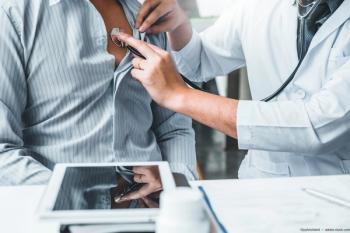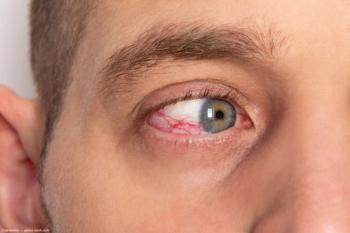
How my practice is recovering from COVID-19
If ODs have been around long enough, they have most likely experienced 1 or 2 economic downturns in their life. For me, the first was the dot-com bubble that burst in the early 2000s. Now that the COVID-19 pandemic is upon us, I am living through my third economic downturn (the second was “The Great Recession” of 2008).
The good news is, so far, I have recovered from 100 percent of all previous economic catastrophes. And in hindsight, I have come to realize they all have shaped me, to 1 degree or another, into the person I am today. These critical experiences, while painful, challenge ODs to rethink how they do things, force them to become more resourceful, and provide the environment needed to flourish and grow.
In my experience, when a business is in crisis, the owner(s) often experience predictable stages of grief similar to that of the loss of a loved one (see figure 1). Once these stages are recognized, it becomes possible to make better choices toward recovery. If ODs bury their heads in the sand, become desperate or panic, they make poorer decisions than if they manage their emotions, carefully analyze the obstacles before them, and gain as much knowledge from others as they can. This then positions them to make good choices that will propel them up and out of their current circumstances.
Author Suzy Welch, wife of the late management guru Jack Welch, wrote in her book 10-10-10: A Life-Transforming Idea that every decision should be considered from a perspective of how it might impact us in 10 minutes, 10 months, and 10 years. Decisions that might provide short-term relief often result in long-term pain. For example, if you made the difficult decision to close your office and furlough your employees, it likely created short-term pain and anxiety. However, most will look back in 10 months or 10 years and realize this was the best decision for the safety and well-being of their patients, their teams, and their practices.
I believe we are moving through the phase of deliberate action and into preparedness and opportunity, the last stage, which will drive businesses forward into prosperity (Figure 1). This is a great place to be as it allows ODs to look forward and embrace new opportunities that may have not been apparent.
As ODs continue to build and execute their recovery plans, I am focusing on 3 main areas within my practice, which include:
1. Operational recovery
2. Financial recovery
3. Mental/emotional recovery
Operational recovery
Operational recovery may be the most critical because it drives everything within the business. For instance, in my practice we had to consider how and when we would notify our patients that we were back in business; how we would manage our staff, such as when we bring them back and who comes back; how we would manage our facility, in particular, what steps to take to keep our facilities clean and our frame inventory sterile.
Financial recovery
Most practice owners honored the “shelter in place” guidelines, providing only essential and emergency services to their patients, which resulted in both a financial and emotional nightmare. With no practice revenue, it became impossible to meet the financial obligations of the practice. We have had to make the difficult decisions of which bills to pay, who gets paid first (if at all), and we are just now considering how we are going to dig ourselves out with our vendors.
My practice’s financial recovery plan starts with determining:
• Working capital, that is, the difference between what we have in the bank compared to what we owe our vendors
• Calculating our cash burn rate, i.e., how fast we are utilizing cash in the business to keep ourselves afloat; and
• Building a 90-day recovery budget because the next 60 to 90 days could prove to be the most challenging financially as we get the engine running again
Mental/emotional
As ODs think about recovery, they must consider the mental and emotional toll this pandemic has played on everyone. There will, no doubt, be mental health “aftershocks” that occur. These might include the stress of wondering how to pay bills, a possible loss of identity, or even loss of a job. For some, the loss of structure and routine can lead to depression, and once reality sets in, serious mental health concerns could follow. A COVID-19 hangover could leave us feeling anxious and depressed.
While vacations provide the mental break that our brains need to stay refreshed, excited, and energetic, fortunately for most of us the routine is what people ultimately crave. It is just those first few days (and possibly weeks) that can be challenging. Mental and emotional recovery is dependent on quickly getting back into the routine of running our businesses.
Final thoughts
I have not shaved in over 2 months. My beard is beyond the critical itchy phase, and I am enjoying the extra 5 minutes every morning staring out the window into my backyard.
It is interesting to consider what good has come of this experience. As somewhat of an introvert, I have enjoyed more quiet time; becoming more organized; spending more time with my wife, kids, dog, and guitar (not in that order); and doing yoga more consistently.
I have also become more friendly and considerate. Through my mask, I now ask the Rite Aid cashier how she is doing and thank the Amazon driver for his hard work. There is just something about all of us being in this together that has brought us a little closer. After the virus is gone, it will be interesting to see if we stay infected with the good that has come of this.
Mick Kling, OD is CEO of Invision Optometry and founder of Impact Leadership which provides coaching, speaking and business finance workshops for optometrists. He can be reached at mick@impactod.com.
Newsletter
Want more insights like this? Subscribe to Optometry Times and get clinical pearls and practice tips delivered straight to your inbox.













































